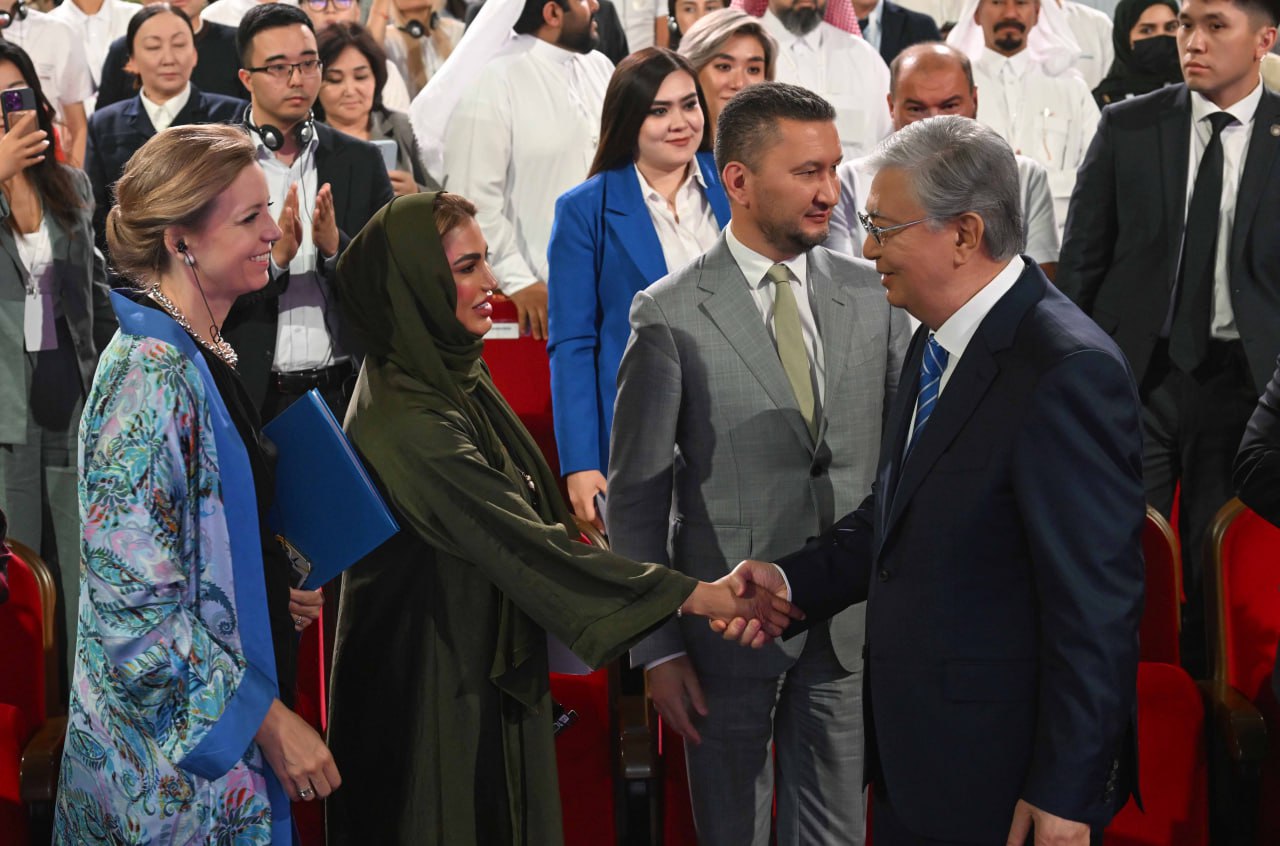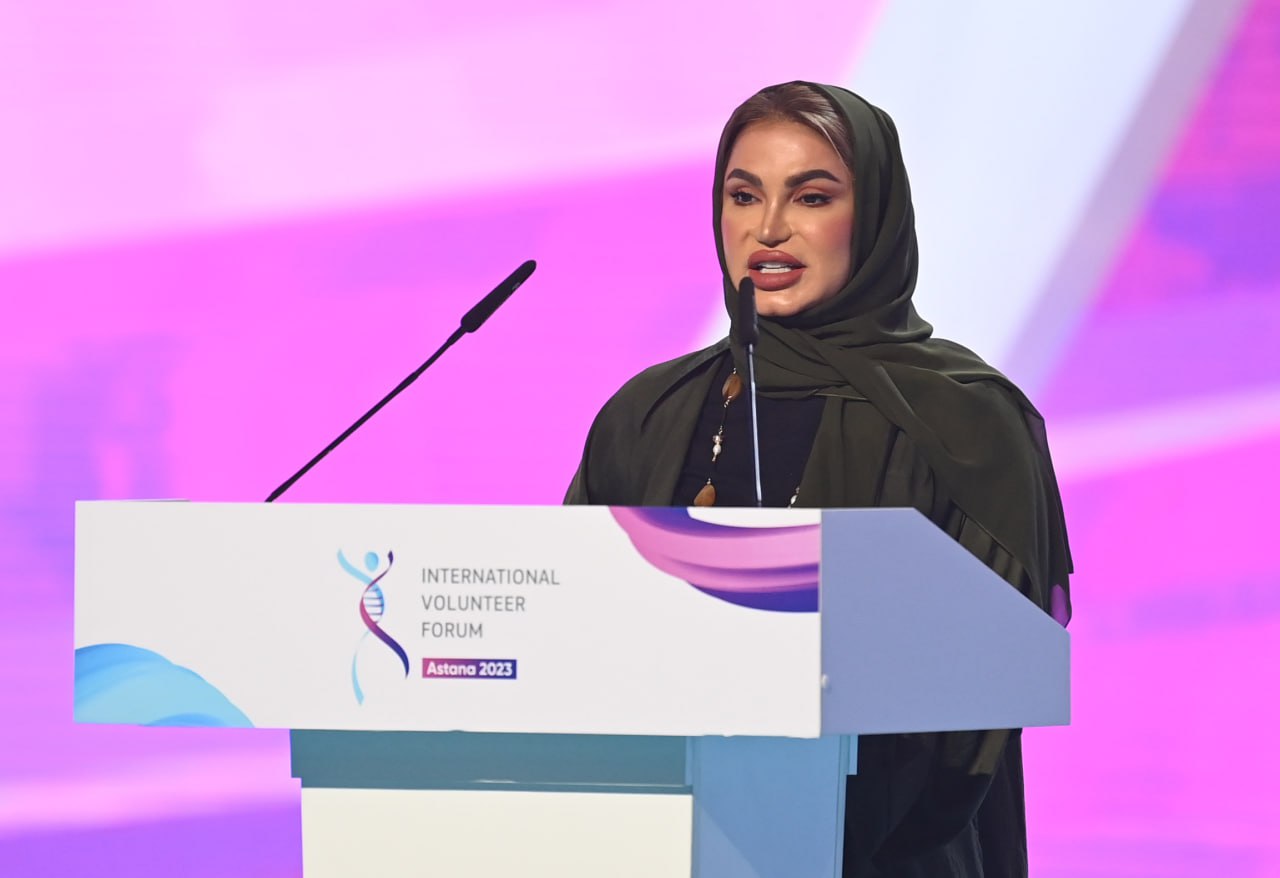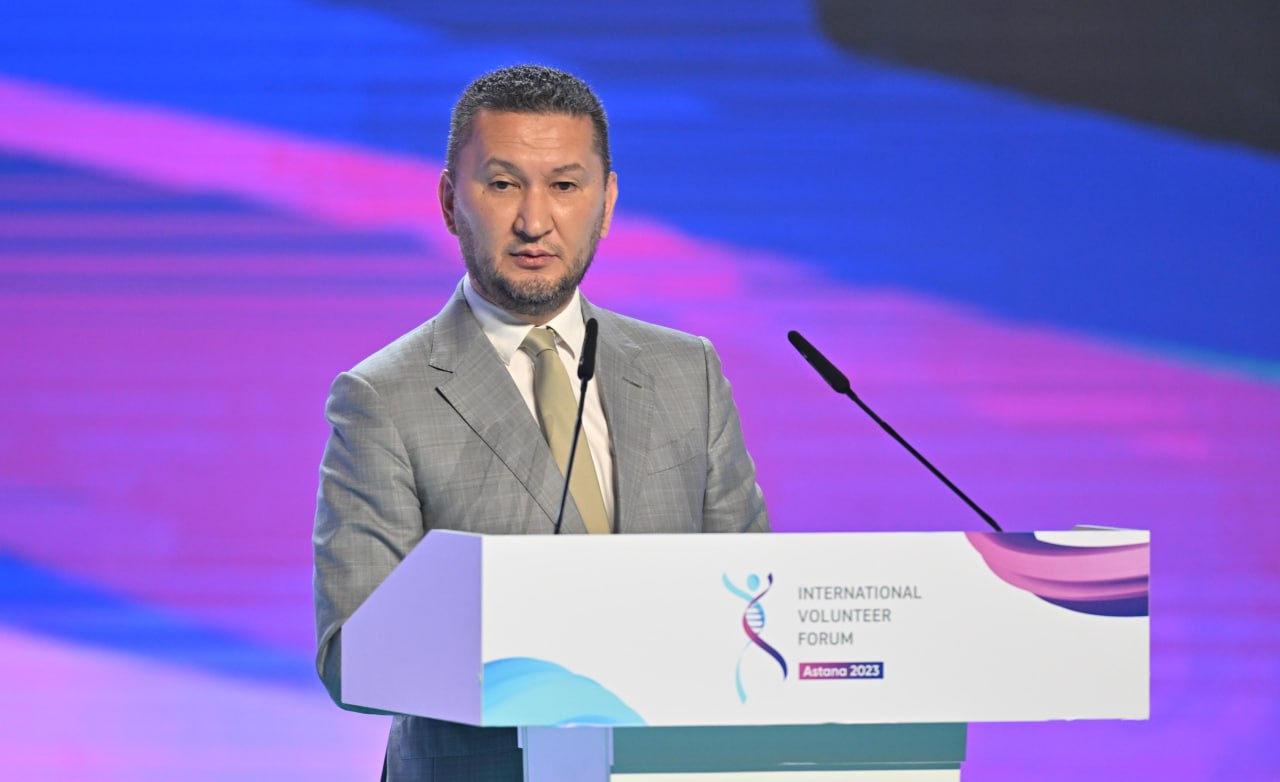ASTANA – President Kassym-Jomart Tokayev outlined his vision for the development of volunteerism in Kazakhstan on the second day of the International Volunteer Forum in Astana on June 21, speaking alongside distinguished experts and representatives of international organizations.

President Tokayev shook hands with UAE’s Ministry of Tolerance Director General Afra Mohammed Al-Sabri, along with UNV Executive Coordinator Toily Kurbanov (M) and UN Resident Coordinator for Kazakhstan Michaela Friberg-Storey (L). Photo credit: Akorda press service.
President Tokayev said Kazakhstan recognizes the important role volunteers undertake as “patriots of one’s country” and their goodwill, which is also inherent in the Kazakh people’s traditions.
“Our people have always extended a helping hand to those in need. In difficult times, rallying together, people found a way out of a difficult situation. Many representatives of ethnic groups that were deported to Kazakhstan have found their second home here. Therefore, the goal of today’s forum is undoubtedly consonant with the way of life of the Kazakh people,” he said.
By instilling a spirit of volunteerism, countries can have culturally aware and civic-minded people who are positively benefiting local and global communities, said Tokayev.
“I believe that strong volunteering and philanthropy traditions reflect the development and maturity level of a society. People with an active life and high sense of responsibility can drive real change in their country’s future and the entire world,” he said.
From this belief, Kazakhstan has developed and implemented a series of initiatives in the sphere of volunteering, including declaring 2020 as the Year of the Volunteer and adopting the government roadmap for the development of volunteering in 2021-2023.
As a result of these initiatives, the number of volunteer organizations in the country has tripled to 680, and the number of volunteers has reached 200,000. To support these efforts, front offices have been established in all regions, providing training to volunteers. Additionally, the qazvolunteer.kz website was established to facilitate volunteer engagement.
President Tokayev outlined how the volunteer movement can be developed in the coming years.
He proposed to launch a new roadmap that establishes a clear strategic vision and direction for the coming years. Introducing an accounting system for volunteer charitable activities, supporting volunteering activities through long-term grants and developing the institutional support infrastructure for volunteering were among the proposed steps.
“Finally, we must place greater emphasis on supporting international cooperation in voluntary activities. All volunteers should become part of a larger international network and actively participate in the global volunteers’ movement. This forum clearly shows that joint efforts toward these goals are of vital importance,” said Tokayev.

Afra Mohammed Al-Sabri, Director General of the UAE Ministry of Tolerance. Photo credit: Akorda press service.
Director General of the Ministry of Tolerance of the United Arab Emirates Afra Mohammed Al-Sabri expressed her gratitude for the invitation to the forum.
“I am honored to be among you today to work together to spread the culture of volunteerism in our countries, and for this important forum to be an appropriate opportunity for all of us to present our experiences, share them and work together to strengthen the values of volunteerism,” she said.
Al-Sabri also suggested several ways how volunteering could advance in the future, including using advanced technologies, such as artificial intelligence, realizing sustainable partnerships between institutions and organizations to empower volunteers, and encouraging innovation and entrepreneurship in volunteering.

UNV Executive Coordinator Toily Kurbanov. Photo credit: Akorda press service.
Toily Kurbanov, the United Nations Volunteers Executive Coordinator, said the forum builds on the traditions of hosting global conferences in Astana, and it is very much in the “Astana style,” providing a rich agenda, rigorous preparation, openness to the world, and warm Kazakh hospitality.
“Still, this forum is unusual. It brings together practitioners from the unique world of volunteering. A world of people devoted to their communities and their nations, working hard, but definitely not looking for glory. It is the combination of Astana-style and the humble nature of volunteerism that can help start a new chapter in the development of volunteerism,” he said.
At a time when the world is experiencing a shift from the industrial era to the post-industrial economy, Kurbanov highlighted that the experience of volunteering is also undergoing transformation, specifically by adapting to the digital landscape.
From fundraising to mentoring and counseling, volunteering can be effective not only in local contexts but also in online settings.
“In the digital world, more and more tasks and interactions are becoming independent of location. With the right systems in place, this opens up new possibilities for online volunteers, from displaying and processing data and translations to editing audiovisual messages,” he said.
When Türkiye and Syria were struck by an earthquake earlier this year, the first volunteers deployed were online volunteers, said Kurbanov.
“The very first people we mobilized after the earthquake were online volunteers who provided remote counseling in Turkish, Kurdish and Arabic to children in the affected areas,” he said.
The first day of the forum on June 20 focused on the importance of developing international volunteering and exploring ways it could contribute to resolving modern-day issues.
